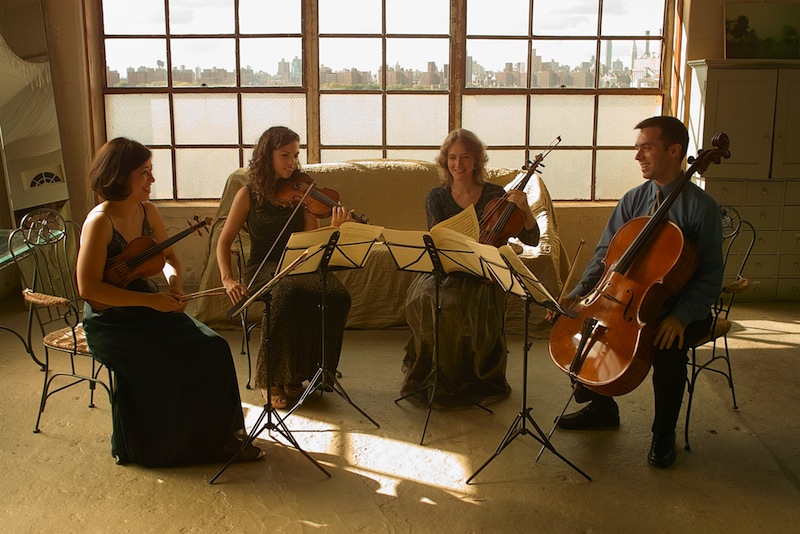A rich American tapestry opens Momenta Quartet festival
There is currently–and happily–a glut of fine string quartets on the local concert scene. With so many skillful ensembles around, how does one separate oneself from the crowd?
If you’re the Momenta Quartet, you start your own festival, the hopefully annual Momenta Festival, which opened Wednesday night at the Tenri Cultural Institute.
This New York ensemble was founded in 2004, and the current group, including founding violist Stephanie Griffin, has been together since 2012. Momenta has notable range, a good sampling of which can be heard on their debut Albany CD, Similar Motion, offering music by Philip Glass, Arthur Kampela, and Debussy. Also, each member of the quartet serves as curator for each of the four concerts, designing the programs and featuring themselves in solos.
Second violinist Adda Kridler devised the opening concert, titled “Americana,” and the program touched on a century’s worth of ideas in American classical music. Some of that story came through two new pieces, DJ Sparr’s Avaloch (2015, written for the quartet), and Dan Visconti’s Warm Surfaces (2014).
Avaloch set the aesthetic tone for the entire concert, the unique sound of American homespun experimentation, free of ideology and full of curiosity. The piece revolves around an agitated, yearning tune, and the music has a rough-hewn quality, like shape-note singing, particularly in the counterpoint. There is also pre-recorded music that played asynchronously from smart phones held inside ceramic pots by each musician.
Avaloch has a fulfilling sense of waywardness, disregarding obvious formal considerations and searching for a shape organic to itself. That quality, and Momenta’s weighty, lyrical playing gave it a social quality that is fundamental to the Ivesian conception of music making.
Warm Surfaces was intriguing but frustrating. The music slowly swells from nothing, via swirling harmonics, into a frenzy of activity. The transformation through time was involving, but once at the climax, the music quickly falls away, then stops. The stopping is the problem, one is left wanting to hear what comes next.
In between the two, Kridler played Morton Feldman’s aphoristic violin solo, For Aaron Copland. Feldman wrote this for a documentary film project on the title composer. As an observer commented, it has the sound of him taking apart the sonorous chords from Appalachian Spring and laying them out, note by note. Less rhythmically complex than Feldman’s late work, the music has his characteristic stillness. Kridler played with a warm, resiny timbre and fine intonation, and a clear appreciation of the beauty of the music.
After Warm Surfaces came an exciting performance of Phillip Glass’s Music in Similar Motion, augmented by violinist Gregory Fulkerson. Playing this early, important Glass masterpiece requires special concentration and agility, the ability to play repetitive patterns with clear articulation and to count not only rhythms but the number of repeats in one’s head.
Momenta played with biting energy. Each time the long, arpeggiated lines reached the distinctive three- or four-note cadence, there was the satisfying sensation of the music bouncing off the bottom and heading back up. Cellist Michael Haas’ sense of rhythm was especially powerful and swinging.
After the break, Kridler played another violin solo, Bread and Roses, by Christian Wolff. Wolff sets the original labor movement song in an earthy way, using open strings, and then subjects the tune to probing variations. The music moves quickly from simply turning the original material around to almost attacking it. Kridler’s perfromance mixed the nobility of the cause with an agonizing harshness.
Momenta finished with a spectacular rendition of Ives’ String Quartet No. 2. The pieces is Ives at his musical and social best. The work is subtitled “for 4 men—who converse, discuss, argue, fight, shake hands, shut up—then walk up the mountain side to view the firmament!” The music is challenging to play, serious but also full of irreverence, with markings like “Allegro con fisto” and “Ad lib snoborita.”
The group tackled Ives like it was written for not only their skills but their attitudes as well. They understood the tenderness and also the humor. In the second movement, the second violin plays a sentimental solo line, only to be shouted down by the other instruments. Kridler showed mounting exasperation before she stood up and walked off, leaving first violinist Emilie-Anne Gendron, violist Griffin, and Haas to enjoy themselves. Then she came storming back, playing all the way.
It’s Ives, so the musicians find consensus through tunes they all love, from “Columbia, The Gem of the Ocean,” to the “Ode to Joy.” Together, in rich harmony, the walked up the mountainside, to view the glorious firmament.
The Momenta Festival continues at Tenri through October 4. Friday, October 1 at 8 p.m., Momenta will play Ysaÿe, Carillo, Glass, Crumb, and Ives. momentaquartet.com



